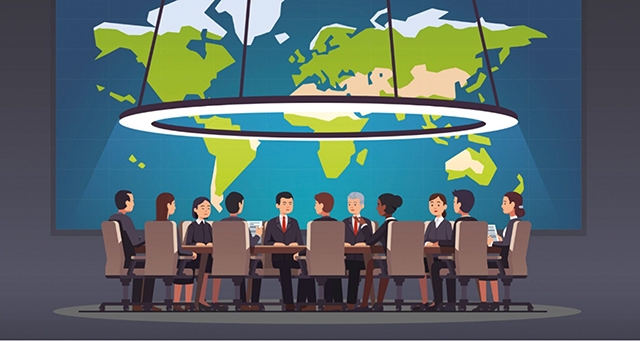Major Geopolitical Trends for 2020
Op-Ed
The year 2020 will be different from 2019 in many ways. To be more precise, larger economic, military and political developments might seem unalterable, but there are various small scale processes in 2020 which would signal the start of long-term changes.
We will start with Georgia. As in the past, the country will continue finding itself between its EU aspirations and a geopolitically hostile Russia. A reinvigorated EU with powerful institutes, renewed enlargement agenda, etc. will strengthen Tbilisi’s outlook. The EU is likely to provide larger financial support to Tbilisi for carrying out sectorial reforms.
In 2020, the EU is also likely to continue pressuring Russia by keeping the existing economic sanctions. At the same time, there will be increased efforts by Brussels and Moscow to improve bilateral relations, but it will be difficult to pull off.
NATO could be another tool to influence Moscow’s behavior in the region. The alliance troops will increase their rotation along Russian borders, while in Georgia NATO will increase its work with the country’s military forces. That said, NATO membership for Georgia will still remain a far-off perspective.
Yet another important factor in Georgia’s foreign policy will be China. There will be efforts by Tbilisi and Beijing in 2020 to build deeper economic relations perhaps through investments and trade. All trends show that China will continue seeing Georgia, with its Black Sea ports of Batumi and Poti, as one of the links in its massive ‘Belt and Road initiative’ (BRI). However, it will still be far off for China becoming a security partner in the South Caucasus region.
Georgia will have important parliamentary elections. Whatever results there will be, it is unlikely that the country’s foreign policy will change. However, the elections will have deep-rooted influence on the internal development of the state.
On a global level, Russia will continue facing pressure from the US and the EU. It is unlikely that the sanctions imposed on Russia by the US will be lifted.
Though there will be calls to have better relations with Moscow, real chances to improve US-Russia relations will remain minimal. Too many differences have been piled up across Eurasia in Syria, Ukraine, Africa, Europe, etc. that will complicate Moscow-Washington relations.
In fact, there are indications that the US will increase its military and economic pressure on Russia by helping Ukraine and Georgia. The US government has already evolved in its position on the provision of lethal arms to Kyiv and Tbilisi. That said, it is true that through minor provision of lethal weapons, the military balance is far from being overturned as Moscow, on the contrary will enhance its military position in eastern Ukraine and Georgia’s Abkhazia and Tskhinvali regions.
A large compromise on Ukraine is also unlikely to be reached as Moscow is unwilling to abandon its control over the border section in eastern Ukraine.
The US will have crucial presidential elections, which will be important to watch as Trump has good chances to win the second term. In case this happens, we might see a deeper structural changes taking place across the globe which started in 2016. Thus the US’ global posture will continue to evolve and it will primarily touch upon security situation in Eurasia.
In the Middle East, the US will remain preoccupied with Russian military and diplomatic successes. As Moscow reached high levels of cooperation with Turkey and Iran in 2018-2019, the trend is likely to continue in 2020 as the three countries’ geopolitical imperatives coalesce with one another. This triangle of Russia, Turkey and Iran is not void of disagreements, but in 2020 it could limit the projection of US power across the Middle East. Moreover, as they experience increased US pressure, cooperation between Tehran, Moscow and Ankara will be further solidified.
Overall, this year will be yet another one with high-level competition among major powers, while smaller countries with breakaway conflicts will feel firsthand the ongoing military and diplomatic competition between Russia and the US.
By Emil Avdaliani
Image source: businessgraduatesassociation.com











